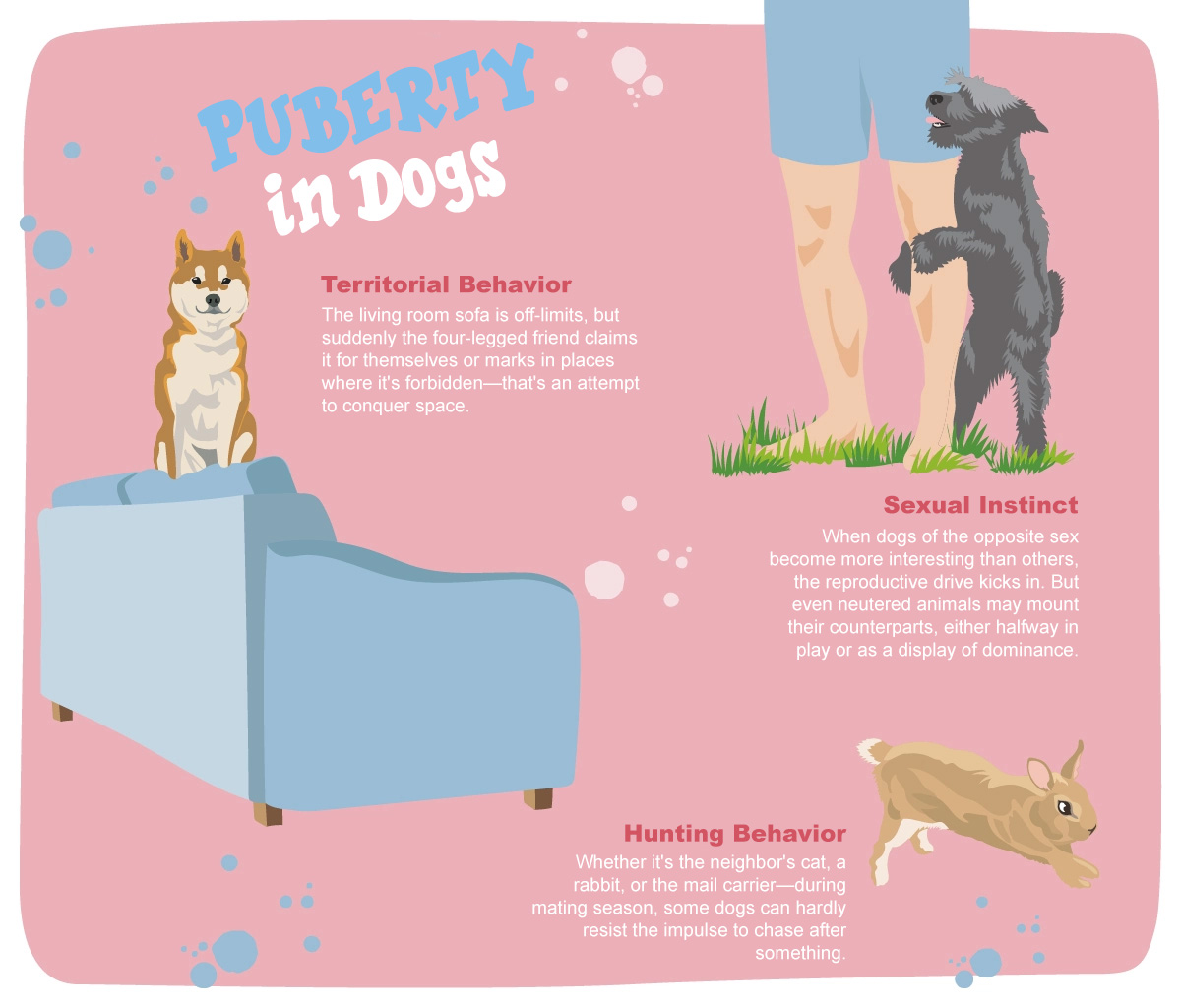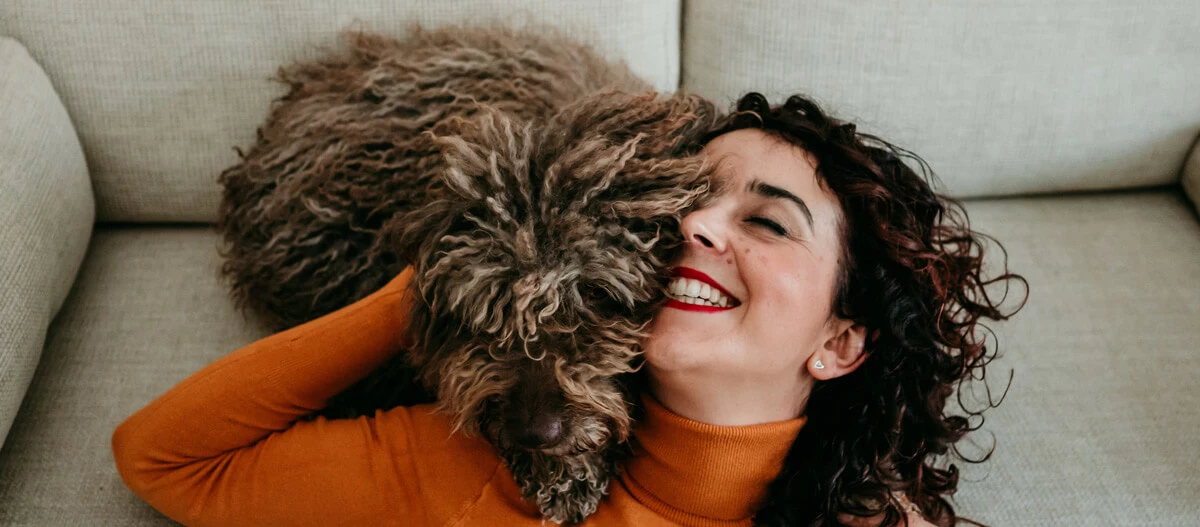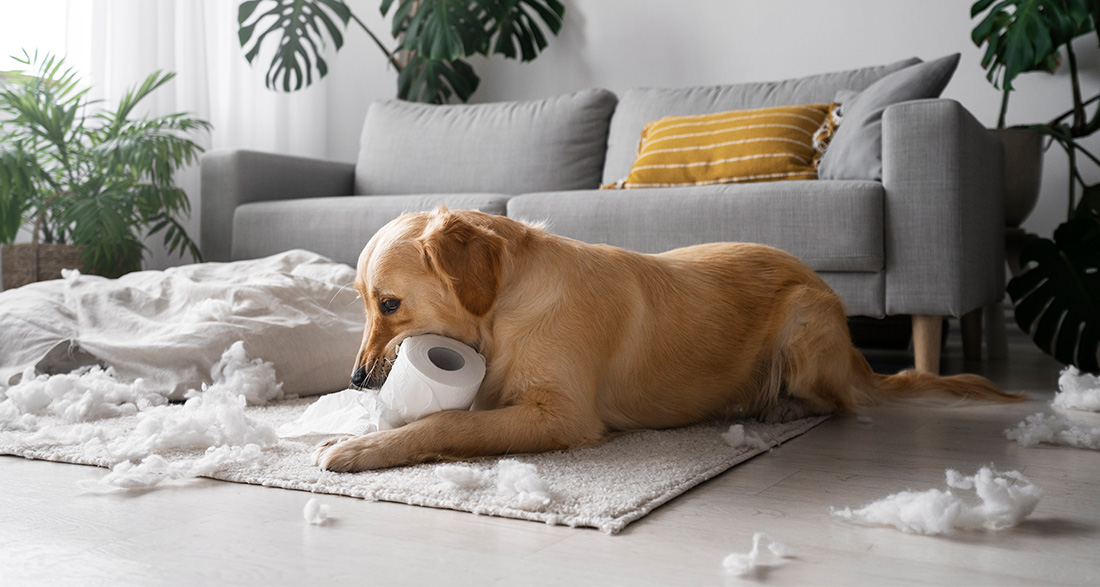Lackadaisical attitude, explosive bursts of activity, and a disregard for authority: dogs going through puberty surprisingly share many similarities with young humans. Don’t worry: This “phase” shall pass too. Here, you’ll find out what puberty in dogs entails and how to handle it.
- What Causes Puberty in Dogs?
- Dog Puberty – Time of Changes
- How Does Puberty Manifest in Dogs?
- At What Age Does Puberty Begin in Dogs?
- Onset of Dog Puberty – Symptoms in Behavior?
- In What Phases Does Puberty Progress in Dogs?
- How Long Does Puberty Last in Dogs?
- What Should I Consider During My Dog’s Puberty?
- Dog in Puberty – Recall Is History!
- Frequently Asked Questions About Puberty in Dogs
What Causes Puberty in Dogs?
Nearly all mammals undergo a transition from childhood to adulthood characterized by significant changes in hormone levels. This phase, known as puberty, marks the transition from childhood to reproductive maturity. Before puberty, animals – just like humans – are not sexually mature. At the onset of puberty, hormone levels skyrocket, signaling the development of reproductive organs and fertility. Simultaneously, the increased hormone levels trigger the development of the entire body and psyche. Puberty is crucial for shaping character and maturing the mind.
During puberty, various changes occur in the canine organism, causing not only physical effects but also confusion, similar to human teenagers. Like human teens, young dogs find themselves in a hormonal turmoil with a myriad of consequences and effects.
Important:
Dogs neutered at a very young age produce minimal sexual hormones, thus not undergoing puberty properly. Consequently, their physical and mental development is also affected. Despite this, early neutering is still common in some countries, especially for dogs from animal shelters.
Dog Puberty – Time of Changes
Here are the key changes your furry friend experiences during puberty:
- Neuronal changes due to intense growth spurts of nerve cells: To optimize brain efficiency, their connections undergo a significant restructuring. Important connections are strengthened while less needed ones are diminished. The prefrontal cortex is the main stage for this restructuring. This brain region translates cognitive processes, thinking, and learning into appropriate reactions. During puberty, impulsive actions may occur due to neuronal changes. Additionally, another brain region – the amygdala – grows during puberty. It is the center for emotions like fear or aggression. Your dog’s emotional life and reactions may become unpredictable at times.
- Hormonal fluctuations: Dopamine, estrogen, and testosterone – the dog’s hormone balance and receptor sensitivity are also in flux. This can lead to stress sensitivity and nervousness in dogs. The animal may react excessively to external stimuli and familiar situations alike: the typical mood swings that puberty brings even in human teenagers.
How Does Puberty Manifest in Dogs?
Puberty in dogs is primarily characterized by the animal encountering its environment with mood swings and a certain level of impulsiveness. Play with other dogs becomes rougher. The extent and form of these effects vary individually depending on the specific animal. However, the common denominator of all the fun and new ideas during the adolescent phase lies in the establishment of “adult” behaviors. What dogs consider “adult,” though, doesn’t always align with the behavior you might expect from a well-behaved, mature dog!

At What Age Does Puberty Begin in Dogs?
There are two sensitive periods in a dog’s life that come with significant changes in behavior and social relationships with other dogs.
The first major change starts with the hierarchy phase: This period between the 13th and 16th week of life is roughly comparable to the toddler’s defiance phase. It represents a sort of pre-puberty stage where your puppy or young dog will first challenge your authority. Increased self-confidence and independent ideas make this phase the first challenge. Typically, the beginning of this pre-puberty stage coincides with the onset of teething.
However, things get really interesting in the next challenging phase – puberty in dogs. Depending on the breed, it occurs between the 7th and 12th month of life, after the completion of teething. Don’t worry – you won’t miss this phase because your dog will draw your attention to the new state with interesting behaviors.
Onset of Dog Puberty – Symptoms in Behavior?
The female dog will experience her first heat cycle, the male dog will begin lifting his leg to urinate, and suddenly find female counterparts very enticing. Additionally, he’ll increasingly compete with other male dogs. Many dog owners notice the onset of puberty not only due to sexual maturity but also because the good behavior of the previously well-behaved four-legged friend suddenly seems to vanish.

In What Phases Does Puberty Progress in Dogs?
True puberty begins between the sixth and twelfth month of life, depending on the breed, and coincides with sexual maturity. However, your dog is far from being “finished” and mature at this point, but rather like an adolescent at the beginning of the transition from childhood to adulthood.
Large breeds enter the “teenage years” a bit later and sometimes reach this phase of puberty only around one year of age. Small dogs often start puberty particularly early. Females mature slightly earlier than males. For females, the first heat cycle signals the start, although the actual hormonal change begins in the weeks before, often not recognizable or perceptible to us humans.
Puberty typically occurs in waves. Most dogs experience about three intense surges between six and 18 to 36 months of age. A noticeable personal maturity often occurs in females after their first heat cycle.
How Long Does Puberty Last in Dogs?
Puberty gradually subsides when the dog is two to three years old and fully grown. For very small dogs that started puberty early, the worst may be over by 18 months. Because they have a short puberty period, the surges are often particularly intense.
The good news: Once the developmental surges are over, the turmoil is over too. During puberty, the four-legged friend also experiences a second phase of bonding with their owner: Take advantage of this and deepen the relationship.
What Should I Consider During My Dog’s Puberty?
To guide your furry friend through the exciting phase of puberty, you’ll need strong nerves, patience, and lots of love. While the young dog previously looked up to you as the pack leader unconditionally, the adolescent now tries to assert independence. The adorable puppy occasionally turns into a stubborn troublemaker. You must be prepared for this when welcoming a young animal into your family and equipped accordingly.
The following tips can help you during your dog’s puberty:
- Authority: Always maintain control. Show understanding for the pubescent dog, but don’t let any misbehavior slide. Remain the unaffected, confident leader that the animal can orient itself to even in the midst of emotional turmoil. Especially if the dog develops fearful tendencies, the security by your side is beneficial. But even if he acts like a troublemaker, you should react appropriately and not pay too much attention to the show. Show yourself unfazed as the pack leader.
- Patience: Some pubescent dogs seem to forget what they’ve learned, appear slow on the uptake, or no longer respond when you call them. Be understanding and dedicate plenty of time to the dog right now. Engage him in learning again and teach him tricks and commands anew with lots of praise and reinforcement – often just a refresher is enough.
- Protection: A pubescent dog knows no danger or risk. Keep a watchful eye on the dog and intervene if the adolescent gets into trouble. For example, keep him on a short leash if he seeks conflict with other dogs.
Tip:
Avoid significant changes during your dog’s puberty, such as moving or introducing entirely new learning content – both could overwhelm the four-legged friend during this sensitive phase.
Dog in Puberty – Recall Is History!
You call and whistle, but your dog couldn’t care less about the recall? Unfortunately, this is a very common side effect of puberty in dogs. Your four-legged companion now simply has something better and more important to do. Don’t be upset – your dog sometimes can’t hear you because he’s lost in thought elsewhere. It often takes two or three attempts for your voice to penetrate the pubescent young dog’s brain, fogged with scents.
Tip: Stay on it and continue training the recall. Use the long line again to secure your dog and consistently follow your training concept. Just expect your dog to be more easily distracted and have trouble focusing on you and your commands.
Frequently Asked Questions About Puberty in Dogs
Below, we address particularly frequently asked questions and problems about puberty in dogs. Perhaps you’ll find your dog or your questions reflected here?
Should I have my dog neutered now?
No. When hormones are raging, you may consider the idea. But if you think you can handle your beloved better after neutering, you may be disappointed. It’s true that neutered males no longer chase every female in heat and their aggressive territorial behavior decreases. However, most behavioral patterns are the result of upbringing and character. Hormones have only a minor influence on this. Moreover, you won’t bypass puberty with such an intervention: The dog should be neutered only when he is physically and mentally mature. Dogs neutered before or during puberty later show increased aggression or become overly anxious. It’s advisable to try a hormone chip first.
Is My Dog Hyperactive During Puberty?
It’s not uncommon for the onset of puberty in dogs to be accompanied by a strong inner restlessness in the four-legged friend. Instead of sleeping, your furry friend restlessly wanders around the house. While walking, your dog constantly runs from left to right. He seems almost “driven.” No wonder, as with the onset of sexual maturity, interest in the opposite sex increases. All smells are even more intriguing, and one doesn’t want to miss anything. Ensure an adequate number of breaks and maintain calm in the house.
Is My Dog Becoming Rebellious During Puberty?
The meaning of the word “No” is a fundamental part of basic training. Your puppy learned what “No” means early on but seems to have forgotten it now? That’s part of growing up. Your dog is now making decisions based on entirely new priorities. What’s more important – the command or their own plans?
Tip: Increased independence is normal and part of this developmental stage. However, ensure to secure the dog more when he tends to ignore your commands. Whoever doesn’t listen needs to be put on a leash. Perhaps it’s time to resume long-line training?
Dog Puberty: Why Is My Dog More Affectionate Than Before?
Your dog now follows you everywhere. No matter where you go in the house, the shadow is always within sight.
Some dogs need particularly close care and a lot of love during puberty. But many also discover “controlling” for themselves. The new attachment is then more a sign that your dog believes it always needs to keep an eye on you. This behavior is not desired because it’s not your dog’s job. Send your furry friend to the mat every now and then or close the door behind you when you leave the room.
For some dogs, the loss of control comes with separation anxiety. It’s best to read up on where this comes from and what you can do about it.
Dogs in Puberty: Can My Dog Have Depression?
Your dog doesn’t feel like doing anything and just quietly lies whining in his basket? But everything is fine health-wise? Then puberty in dogs could indeed be responsible for the phenomenon. Anxiety is also more common in this phase. Many “puberty pets” are frightened by everyday objects such as the yellow bag on the corner or loud noises during walks.
Behind this are the altered concentrations of neurotransmitters in the brain. Take the problems seriously and respond to your dog’s mood swings. Perhaps you can lift him out of the bad mood with a special activity? With anxiety, your dog needs primarily your reassurance and encouragement.
Do Dogs Experience Diarrhea and Other Problems During Puberty?
Some four-legged friends even develop physical problems because they are so stressed during canine puberty. Does your dog have diarrhea during puberty? This is not uncommon and is not a cause for concern as long as it does not persist for too long. Loss of appetite or skin problems can also occur during puberty.
Why Is My Dog Showing Aggressive Behavior During Puberty?
Like depression and anxiety, aggressive behavior can also be a side effect of puberty in dogs. Hormones and the changes they trigger in the brain are responsible.
As dogs are also in the phase of establishing pack order during puberty, they need a certain level of aggression to assert their new position. Especially in interactions with same-sex dogs, many four-legged friends show increasingly aggressive behavior during puberty. Here’s how you can best handle dog encounters.
What Should I Do If My Dog Bites Me During Puberty?
Is your dog’s aggression not only directed towards other dogs but also towards you? This is a serious problem that you should not deal with alone. Seek professional help from a dog trainer immediately. In the meantime, you should secure your dog with a muzzle. This is especially important when you’re out and about. It’s essential to prevent your aggressive dog from injuring a person. With appropriate and timely help, it is often possible to successfully assist an aggressive dog.


